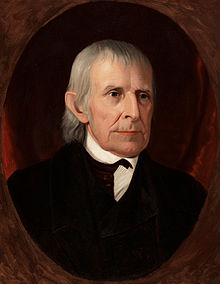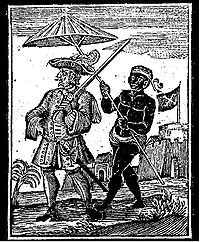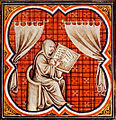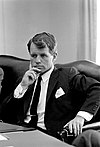Portal:Biography
The Biography Portal
A biography, or simply bio, is a detailed description of a person's life. It involves more than just basic facts like education, work, relationships, and death; it portrays a person's experience of these life events. Unlike a profile or curriculum vitae (résumé), a biography presents a subject's life story, highlighting various aspects of their life, including intimate details of experience, and may include an analysis of the subject's personality.
Biographical works are usually non-fiction, but fiction can also be used to portray a person's life. One in-depth form of biographical coverage is called legacy writing. Works in diverse media, from literature to film, form the genre known as biography.
An authorized biography is written with the permission, cooperation, and at times, participation of a subject or a subject's heirs. An unauthorized biography is one written without such permission or participation. An autobiography is written by the person themselves, sometimes with the assistance of a collaborator or ghostwriter. (Full article...)
Featured biographies –

John Adam Eckfeldt (June 15, 1769 – February 6, 1852) was an American worker and official during the first years of the United States Mint. A lifelong Philadelphian, Eckfeldt served as the second chief coiner of the Mint, from 1814 until 1839.
Eckfeldt's father owned a large smithy and involved himself in early attempts at American coinage. Adam Eckfeldt built early presses for the Mint, engraved some of its early dies, and was responsible for the designs of early American copper coinage, as well as the 1792 half disme which some authorities consider the first United States coin. He was appointed assistant coiner of the Mint in 1796, and became chief coiner on his predecessor's death in 1814. (Full article...)
Born in England, Brooks emigrated to Australia as a toddler and started swimming lessons after nearly drowning in a childhood accident. After initially being known for his lack of technique, Brooks quickly rose through the youth ranks. Brooks made his debut at the Australian Championships in 1976, but it was not until 1979 that he medalled at national level and made his debut for Australia at a FINA (Fédération Internationale de Natation) Swimming World Cup meet. In 1980, he gained prominence by breaking the Australian record in the 100 m freestyle and being invited to a national team camp. There he had his first clash with officialdom, walking out after accusing the officials of neglecting him. He then qualified for the Australian team for the 1980 Moscow Olympics, defying political pressure to boycott the Games in the wake of the Soviet invasion of Afghanistan. Arriving in Moscow, Brooks' experience in the 100 m freestyle was an unpleasant one, suffering an asthma attack and missing the final. The peak of his swimming career came in the 4 × 100 m medley relay, when he caught and passed the Soviet Union's Sergey Kopliakov during the anchor leg to seal a narrow victory for Australia. This victory remains the only time that the United States did not win the event at Olympic level. (Full article...)
Nicholas James Adenhart (August 24, 1986 – April 9, 2009) was an American right-handed baseball starting pitcher who played parts of two seasons in Major League Baseball (MLB) for the Los Angeles Angels of Anaheim. In just four career games, Adenhart pitched 18 innings and posted a win-loss record of 1–0.
A graduate of Williamsport High School, Adenhart was highly touted as a high school prospect until an injury in his final game required Tommy John surgery. The Angels drafted him in the 14th round of the 2004 Major League Baseball draft, and began playing in their minor league system after the surgery was a success. He spent three full seasons in the minor leagues before making his major league debut on May 1, 2008. After appearing in three games, Adenhart spent the rest of 2008 in the minor leagues developing his skills, and in 2009 he earned a spot in the Angels' starting rotation. (Full article...)
Alexander II Theos Epiphanes Nikephoros (Ancient Greek: Ἀλέξανδρος Θεός Ἐπιφανής Νικηφόρος Áléxandros Theós Épiphanḗs Nikēphóros, surnamed Zabinas; c. 150 BC – 123 BC) was a Hellenistic Seleucid monarch who reigned as the King of Syria between 128 BC and 123 BC. His true parentage is debated; depending on which ancient historian, he either claimed to be a son of Alexander I or an adopted son of Antiochus VII. Most ancient historians and the modern academic consensus maintain that Alexander II's claim to be a Seleucid was false. His surname "Zabinas" (Ζαβίνας) is a Semitic name that is usually translated as "the bought one". It is possible, however, that Alexander II was a natural son of Alexander I, as the surname can also mean "bought from the god". The iconography of Alexander II's coinage indicates he based his claims to the throne on his descent from Antiochus IV, the father of Alexander I.
Alexander II's rise is connected to the dynastic feuds of the Seleucid Empire. Both King Seleucus IV (d. 175 BC) and his brother Antiochus IV (d. 164 BC) had descendants contending for the throne, leading the country to experience many civil wars. The situation was complicated by Ptolemaic Egyptian interference, which was facilitated by the dynastic marriages between the two royal houses. In 128 BC, King Demetrius II of Syria, the representative of Seleucus IV's line, invaded Egypt to help his mother-in-law Cleopatra II who was engaged in a civil war against her brother and husband King Ptolemy VIII. Angered by the Syrian invasion, the Egyptian king instigated revolts in the cities of Syria against Demetrius II and chose Alexander II, a supposed representative of Antiochus IV's line, as an anti-king. With Egyptian troops, Alexander II captured the Syrian capital Antioch in 128 BC and warred against Demetrius II, defeating him decisively in 125 BC. The beaten king escaped to his wife Cleopatra Thea in the city of Ptolemais, but she expelled him. He was killed while trying to find refuge in the city of Tyre. (Full article...)
Richard Gavin "Dick" Reid (17 January 1879 – 17 October 1980) was a Canadian politician who served as the sixth premier of Alberta from 1934 to 1935. He was the last member of the United Farmers of Alberta (UFA) to hold the office, and that party's defeat at the hands of the upstart Social Credit League in the 1935 election made him the shortest serving premier to that point in Alberta's history.
Born near Glasgow, Scotland, Reid worked a number of jobs as a young adult—including wholesaler, army medic (during the Second Boer War), farmhand, lumberjack and dentist—and immigrated to Canada in 1903. He involved himself in local politics and joined the recently formed UFA, which nominated him to run in the 1921 provincial election as its candidate in Vermilion. The UFA won the election, and Reid served in several capacities in the cabinets of premiers Herbert Greenfield and John Edward Brownlee, where he established a reputation for competence and fiscal conservatism. When a sex scandal forced Brownlee from office in 1934, Reid was the caucus' unanimous choice to succeed him as premier. (Full article...)
Uroš Drenović (Serbian Cyrillic: Урош Дреновић; 1911 – 29 May 1944) was a Bosnian Serb military commander in the central Bosnia region of the fascist puppet state known as the Independent State of Croatia (NDH), led by the Ustaše, during World War II. After distinguishing himself in resisting the Ustaše alongside communist-led rebels, Drenović betrayed the communist-led Partisans and began to collaborate with the Ustaše, Italians and Germans against them.
Following the German-led Axis invasion of Yugoslavia in April 1941, the Ustaše implemented genocidal policies against the NDH's Serbs, Jews and Roma. Drenović joined the Partisans and distinguished himself during the initial uprising against the NDH government by capturing the town of Mrkonjić Grad in August 1941. He was then appointed to command the 3rd "Petar Kočić" Battalion in central Bosnia and was appointed the deputy commander of the 3rd Krajina Detachment. A Serbian nationalist with anti-Muslim and anti-Croat views, Drenović eventually betrayed the Partisans and sided with the royalist, Serbian nationalist Chetniks, whose ideology more closely matched his own. In April 1942, Drenović fled to Banja Luka after his units were defeated by the Partisans. There, out of military and political necessity, he concluded an alliance with the NDH against the Partisans. Drenović later began collaborating with the Italians and Germans against the Partisans and continued to do so until his death in an Allied bombing raid on Banja Luka in May 1944. (Full article...)
Peter Martyr Vermigli (/vɜːrˈmɪɡli/; 8 September 1499 – 12 November 1562) was an Italian-born Reformed theologian. His early work as a reformer in Catholic Italy and his decision to flee for Protestant northern Europe influenced some other Italians to convert and flee as well. In England, he influenced the Edwardian Reformation, including the Eucharistic service of the 1552 Book of Common Prayer. He was considered an authority on the Eucharist among the Reformed churches, and engaged in controversies on the subject by writing treatises. Vermigli's Loci Communes, a compilation of excerpts from his biblical commentaries organised by the topics of systematic theology, became a standard Reformed theological textbook.
Born in Florence, Vermigli entered a religious order and was appointed to influential posts as abbot and prior. He came in contact with leaders of the Italian spirituali reform movement, and read Protestant theologians such as Martin Bucer and Ulrich Zwingli. Through reading these works and studying the Bible and the Church Fathers, he came to accept Protestant beliefs about salvation and the Eucharist. To satisfy his conscience and avoid persecution by the Roman Inquisition, he fled Italy for Protestant northern Europe. He ultimately arrived in Strasbourg where he taught on the Old Testament of the Bible under Bucer. English reformer Thomas Cranmer invited him to take an influential post at Oxford University where he continued to teach the Bible. He also defended his Eucharistic beliefs against Catholic proponents of transubstantiation in a public disputation. Vermigli was forced to leave England on the accession of the Catholic Queen Mary. As a Marian exile he returned to Strasbourg and his former teaching position. Vermigli's beliefs regarding the Eucharist and predestination clashed with those of leading Lutherans in Strasbourg, so he transferred to Reformed Zürich where he taught until his death in 1562. (Full article...)

Arthur William Radford (27 February 1896 – 17 August 1973) was an admiral and naval aviator of the United States Navy. In over 40 years of military service, Radford held a variety of positions including the vice chief of Naval Operations, commander of the United States Pacific Fleet and later the second chairman of the Joint Chiefs of Staff.
With an interest in ships and aircraft from a young age, Radford saw his first sea duty aboard the battleship USS South Carolina during World War I. In the inter-war period he earned his pilot wings and rose through the ranks in duties aboard ships and in the Bureau of Aeronautics. After the U.S. entered World War II, he was the architect of the development and expansion of the Navy's aviator training programs in the first years of the war. In its final years he commanded carrier task forces through several major campaigns of the Pacific War. (Full article...)
Alfred Manuel "Billy" Martin Jr. (May 16, 1928 – December 25, 1989) was an American Major League Baseball second baseman and manager who, in addition to leading other teams, was five times the manager of the New York Yankees. First known as a scrappy infielder who made considerable contributions to the championship Yankee teams of the 1950s, he then built a reputation as a manager who would initially make bad teams good, before ultimately being fired amid dysfunction. In each of his stints with the Yankees he managed them to winning records before being fired by team owner George Steinbrenner or resigning under fire, usually amid a well-publicized scandal such as Martin's involvement in an alcohol-fueled fight.
Martin was born in a working-class section of Berkeley, California. His skill as a baseball player gave him a route out of his home town. Signed by the Pacific Coast League Oakland Oaks, Martin learned much from Casey Stengel, the man who would manage him both in Oakland and in New York, and enjoyed a close relationship with Stengel. Martin's spectacular catch of a wind-blown Jackie Robinson popup late in Game Seven of the 1952 World Series saved that series for the Yankees, and he was the hitting star of the 1953 World Series, earning the Most Valuable Player award in the Yankee victory. He missed most of two seasons, 1954 and 1955, after being drafted into the Army, and his abilities never fully returned; the Yankees traded him after a brawl at the Copacabana club in New York during the 1957 season. Martin bitterly resented being traded, and did not speak to Stengel for years, a time during which Martin completed his playing career with various teams. (Full article...)

![Image 1 Noether c. 1900–1910 Amalie Emmy Noether (US: /ˈnʌtər/, UK: /ˈnɜːtə/; German: [ˈnøːtɐ]; 23 March 1882 – 14 April 1935) was a German mathematician who made many important contributions to abstract algebra. She proved Noether's first and second theorems, which are fundamental in mathematical physics. She was described by Pavel Alexandrov, Albert Einstein, Jean Dieudonné, Hermann Weyl and Norbert Wiener as the most important woman in the history of mathematics. As one of the leading mathematicians of her time, she developed theories of rings, fields, and algebras. In physics, Noether's theorem explains the connection between symmetry and conservation laws. Noether was born to a Jewish family in the Franconian town of Erlangen; her father was the mathematician Max Noether. She originally planned to teach French and English after passing the required examinations but instead studied mathematics at the University of Erlangen, where her father lectured. After completing her doctorate in 1907 under the supervision of Paul Gordan, she worked at the Mathematical Institute of Erlangen without pay for seven years. At the time, women were largely excluded from academic positions. In 1915, she was invited by David Hilbert and Felix Klein to join the mathematics department at the University of Göttingen, a world-renowned center of mathematical research. The philosophical faculty objected, however, and she spent four years lecturing under Hilbert's name. Her habilitation was approved in 1919, allowing her to obtain the rank of Privatdozent. (Full article...)](http://upload.wikimedia.org/wikipedia/en/d/d2/Blank.png)












































